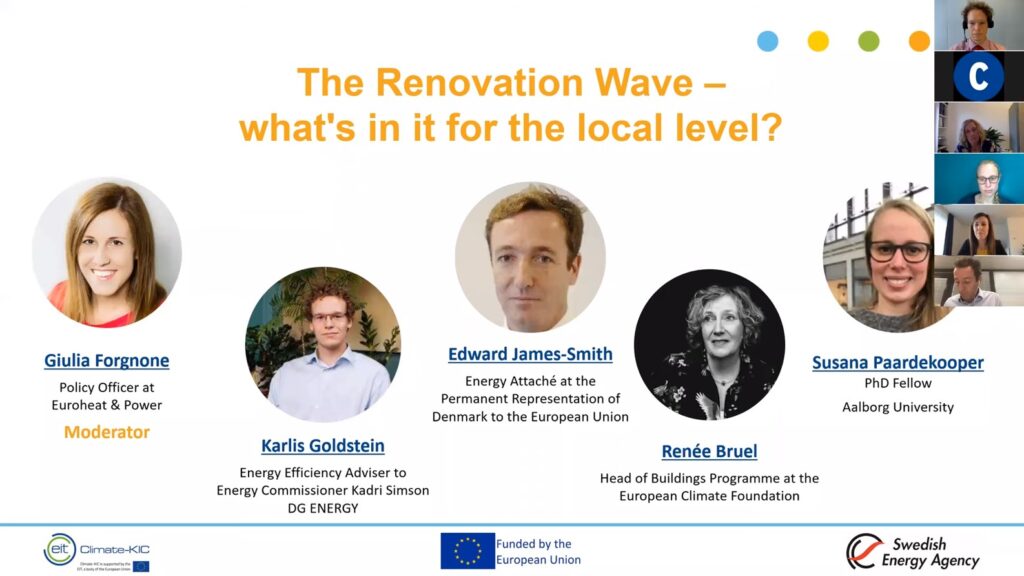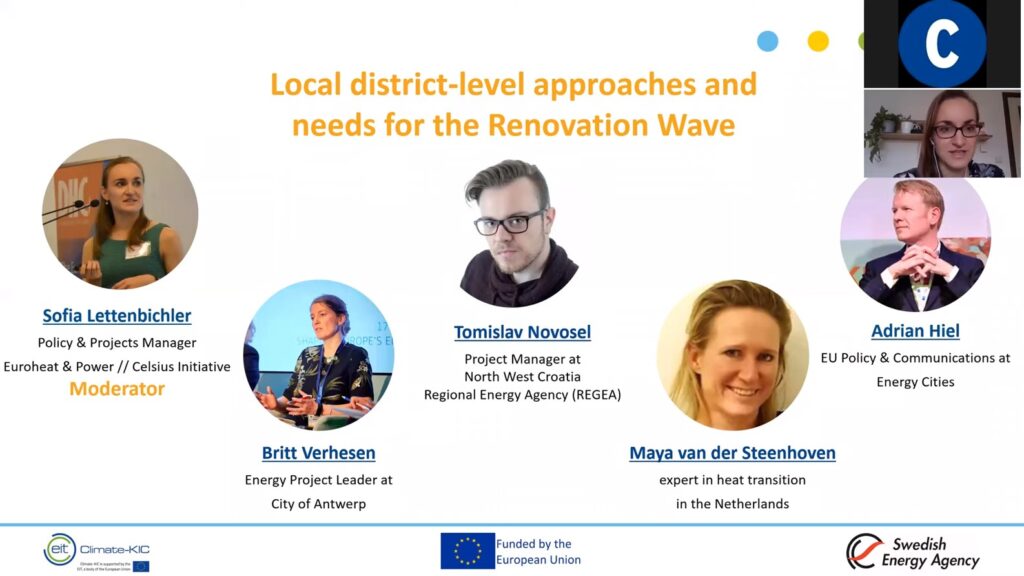This webinar, co-hosted by the Celsius Initiative & EHP, focused on the upcoming Renovation Wave and how it will provide support to cities and regions to decarbonise their building stock.
Euroheat & Power recently co-hosted the webinar “Cities & the Renovation Wave: Impactful District-Level Approaches”, which was organised as part of the Celsius Initiative – a demand driven collaboration hub for efficient and integrated heating and cooling solutions supporting cities in their energy transition. This webinar focused on the upcoming Renovation Wave and how it will provide support to cities and regions to decarbonise their building stock.
In the first session we discussed what is to be expected in the Renovation Wave for cities and particularly what could be the impact of this initiative in the deployment of sustainable heating and cooling. Karlis Goldstein from the European Commission provided an overview of the Renovation Wave’s main priorities such as: fighting energy poverty; renovating public buildings; decarbonising the heating and cooling supply and doing all that by undertaking a neighbourhood approach in which urban planning and digital transformation go hand-in-hand. Edward James-Smith, representing the Danish Permanent Representation to the EU, stressed that the European Commission should be taken a holistic approach with regards to the Renovation Wave, which would among other things, encourage the development and the improvement of DHC systems, as highlighted in the European Council conclusions on the response to the COVID-19 pandemic in the EU energy sector published last June.

Renée Bruel from the European Climate Foundation (ECF) also highlighted the need for measures across all areas to decarbonise the EU building stock and run us through the key findings of the newly published ECF report “Zero Carbon Buildings 2050”. According to this report, the heating fuels switch represents the biggest contribution to the reduction of CO2 emissions in buildings. Last but not least Susana Paardekooper, PhD Fellow at Aalborg University provided us with concrete examples of local aspects to synergies between building renovations and the heat supply.

During the second session “Local district-level approaches and needs for the Renovation Wave” we took a closer look at local-level approaches and projects already under way where heat network pilots and building renovations are complementing each other. A panel made up of local-level representatives, as well as national and European-level experts discussed the roles of cities, their needs and wishes for a European Renovation Wave. Britt Verhesen from the city of Antwerp presented the heat network pilots that the city of Antwerp has identified, and their district-level heat planning approach to decarbonise the building stock.
Looking at Croatia, Tomislav Novosel from the North-West Croatian Energy Agency (REGEA) shared the energy planning project of the city of Karlovac with the audience, where the energy agency supports the city with including the energy and climate plans into the spatial and zoning plans. He highlighted capacity-building in cities as one of the key elements to drive the transition. Maya van der Steenhoven, expert on the heat transition in the Netherlands, provided insights on the Dutch gas-free programme and how an ambitious political framework has kick-started local pilots. She emphasised that the decarbonisation of the building stock and the heat transition is the biggest challenge of the century, but cities currently lack everything – people, knowledge, budget, experience etc. – to make it a reality.
Providing a European perspective, Adrian Hiel from EnergyCities shared his member’s views on the Renovation Wave: the Green Deal puts forward a flood of initiatives that the local level is poised to implement – but they will need the right support mechanisms. He also suggested that there will be multiple Renovation Waves: quick wins like social housing and long-term timeframes like for condominiums.
During the panel discussion the experts agreed that building renovation and heating fuel switch, as well as district heating developments are not a trade-off but rather complementary to each other. They also stressed that communication will be key, as well as that due to the urgency of the issue the ambition has to be high: “We only have one shot to get this right.”
Paul Voss, Managing Director of Euroheat & Power concluded the workshop emphasising that combining district heating and the renovation of buildings is a prescription for a faster and more affordable decarbonisation of our cities’ buildings.